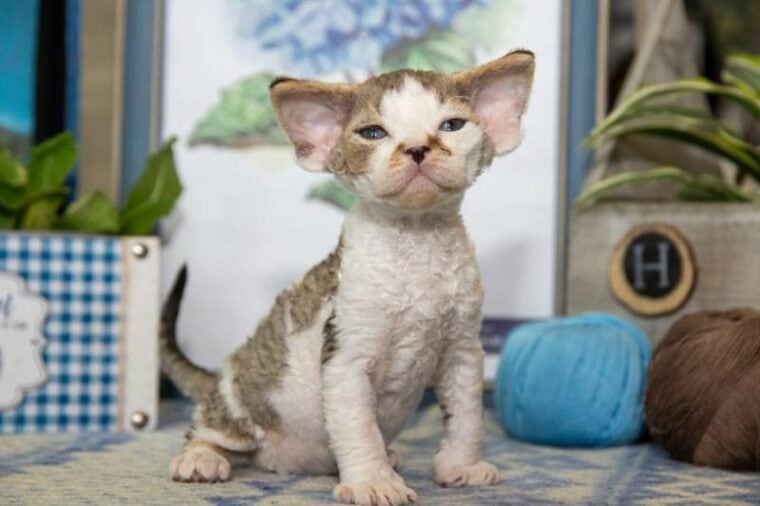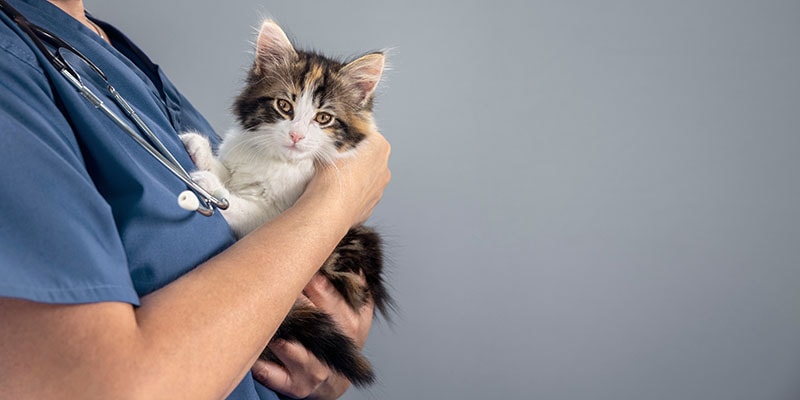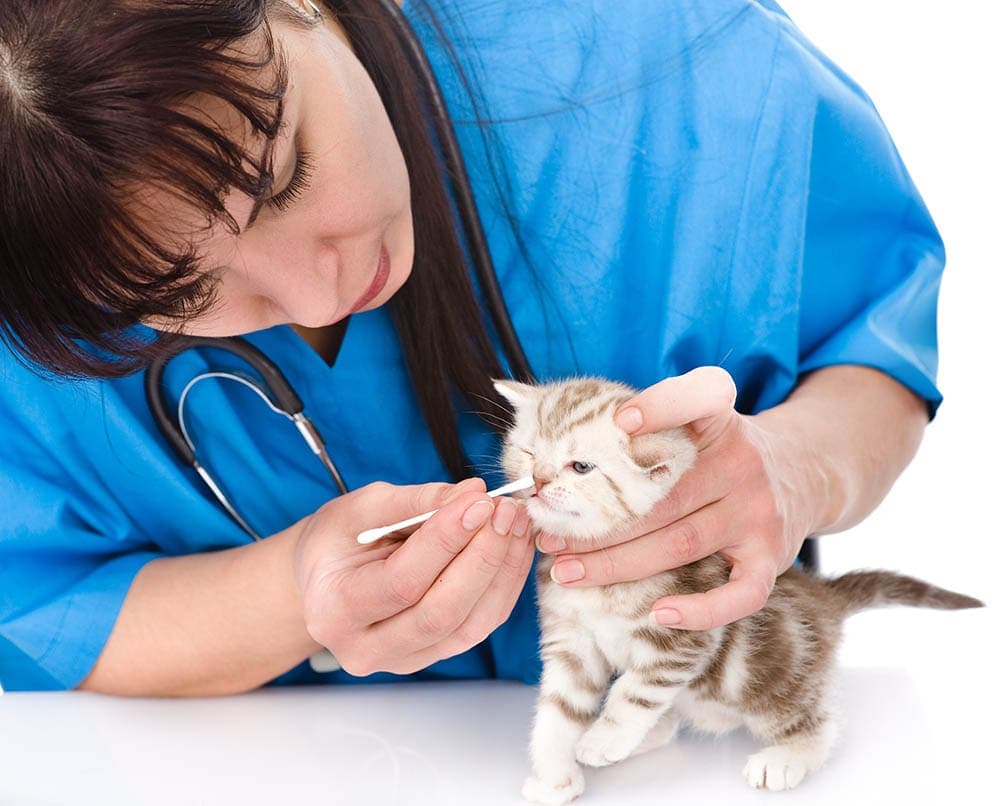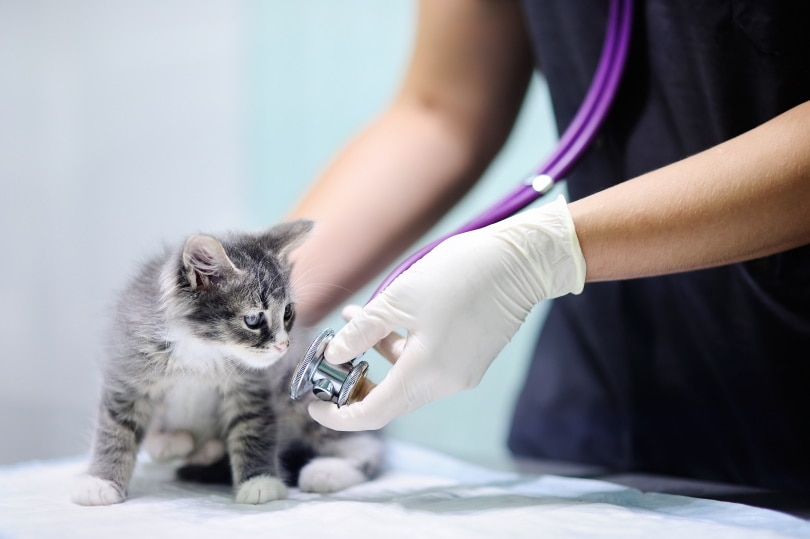
There are few things more adorable than a sneezing kitten. However, it is important to remember that sneezing may indicate a more serious problem. Like humans, cats can catch colds or develop other infections that can impact their health.
While an occasional sneeze is nothing to worry about, frequent sneezing is abnormal and must be investigated by a veterinarian. In this article, we will go over the reasons why your kitten may be sneezing and what to do about it.

The 7 Reasons Your Kitten is Sneezing
1. External Irritant
If you’ve ever walked into a heavily perfumed room and sneezed, you understand how external irritants can induce sneezing. Our kittens are the same way; if dust other irritating airborne particles fill the room, your kitten may experience a sneezing fit.
External irritants can be as dangerous as chemicals or toxins or as non-threatening as everyday household supplies. Some examples of external irritants include:
Countless tiny particles can be irritants for your kitten. If you suspect your cat is sneezing due to an external irritant, try to pinpoint the item and remove it from your home.
2. Foreign Object
Cats are notoriously curious, and young kittens are even more so. If you’ve noticed your cat sneezing more often than usual, it is possible they stuck their nose into something they shouldn’t have.
Foreign objects can get lodged in your kitten’s nose and trigger a sneezing response. Sneezing can often dislodge small objects and eject them from the nose, but in some cases, the foreign item is too stuck to be easily removed. In that instance, you must take your cat to the vet immediately for it to be removed. Under no circumstances should you attempt to remove the item yourself.
3. Upper Respiratory Tract Infection (URTI)
Upper respiratory infections (URIs) affect your kitten’s nose, mouth, sinuses, and throat. These infections can be caused by different infectious agents, such as viruses, and are generally contagious. The most common URIs are feline herpesvirus and feline calicivirus. However, there are many other infections grouped into the category of URIs.
While many URIs are not considered medical emergencies in adult cats, the effects can be much more prominent in young kittens. Some URIs can lead to depression and lack of appetite, which can quickly become fatal in young kittens.
Signs of a URI include inflammation and drainage of the nose and throat, as well as drainage from the eyes. If you notice any of these signs, make an appointment with your vet immediately.

4. Dental Disease
It may sound odd, but dental disease can contribute to excessive sneezing in cats. However, this is far more common in older cats and rare in kittens. The roots of your cat’s teeth are very close to their nasal passages. If they develop a tooth root infection, the barrier between the root and the nasal passage can become damaged. When the barrier is penetrated, your cat may develop nasal discharge (typically from one nostril) and frequent sneezing.
Dental disease is painful, so it is important to reach out to your vet the moment you notice it. Signs that your kitten suffers from mouth disease include excessive drooling, foul breath, bloody saliva, and frequent pawing at the face or head. You may also notice your kitten struggling to eat. They may drop food from their mouth, have difficulty swallowing, or refuse to eat.
5. Bacterial Infections
Bacterial infections typically occur after a primary viral infection has already damaged your kitten’s nasal passages. The most common secondary nasal bacterial infections are Bordetella bronchiseptica, Chlamydophila felis, and Mycoplasma felis. Alongside sneezing, you may also notice a green or yellow discharge from the eyes or nose.
If you suspect your kitten is battling a bacterial infection, you must make an appointment with your vet for the proper treatment.

6. Polyps and Neoplasia
Polyps are benign abnormal growths and can affect kittens and young cats. A nasopharyngeal polyp can cause sneezing, labored and noisy breathing, nasal discharge, head shaking, and something called “reverse sneezing”. This involves a sudden, alarming, honking sound caused by a forceful inhalation of air. Your vet can diagnose and give you the treatment options if your kitty develops a polyp.
Neoplasia, or nasal tumors are, fortunately, rare in kittens. If your cat develops a nasal tumor, they may develop sneezing alongside nasal discharge, facial swelling, and a drop in appetite. In cats, nasal tumors are most often nasal lymphoma.
8. Fungal Infections
It is less likely that your kitten has developed a fungal infection, but it is not impossible. One of the most common fungi to cause sneezing in cats is called Cryptococcus. This infection impacts the respiratory tract with a heavy focus on the nasal cavities. The infection can spread to the eyes, skin, and central nervous system.
If Cryptococcus infects your kitten, you may notice nasal discharge and facial swelling. Your kitten’s skin may also develop small bumps that are either soft or firm. Take your cat to the vet immediately if you notice these signs.


How to Determine if Your Cat’s Sneezing Is Due to External Factors or Illness
It can be difficult to tell whether your kitten is sneezing due to an external irritant or an illness. When in doubt, you should always take your kitten to the vet. Still, there are some steps you can take to determine the reason for the sneezing.
First, consider your cat’s environment. Look around your home and identify possible irritants. Once you’ve identified all of the potential irritants, record where and when these items are used. Then, ask yourself the following questions:
By asking yourself these questions, you can narrow down the root of your cat’s sneezing. You may be able to connect your cat’s sneezing to certain products in your home, or maybe you’ll realize that there is no connection at all. Either way, you will have learned something new about your cat’s sneezing that you can report to your vet.
When Should You Visit the Vet?
If your cat sneezes very occasionally, , there is probably no reason for concern. They may have a little dust on their nose. If your kitten is sneezing consistently but does not appear to have any signs of illness, monitor him closely for a day and see if it goes away. If the sneezing does not go away or worsens, visit your vet immediately. Likewise, if you notice other signs that have been listed above, you should contact your vet.


Conclusion
While sneezing may seem like a minor issue, it can be indicative of a much more severe issue. If you are ever concerned for your kitten’s health, do not hesitate to contact your vet, especially since young kittens are more susceptible to illnesses than older cats. Your vet can make the proper diagnosis and form an effective treatment plan. Soon enough, your kitten will return to the rambunctious ball of fluff you know and love.
Related Reads:
- 10 Fascinating Facts About Your Cat’s Nose (You Never Knew!)
- How To Take Care of a New Kitten: The Complete Guide
- How Often Should You Take a Cat to a Vet? Expert Tips for All Life Stages
Featured Image Credit: Markovets Svetlana, Shutterstock







